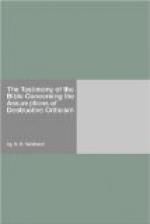It should be known to all lovers of the truth that the skepticism widely sown by the destructive critics has entered the Protestant Church and many of our institutions of learning.
“Read the utterances of representative men and teachers in her communion, who deny the Incarnation, repudiate vicarious sacrifice, make light of the story of the resurrection, and refine the risen Son of God into nothing more than the spirit and essence of truth; or, at most, the disembodied ghost of a man who called himself a Messiah, mistaken in his claims, but authoritative in his morals.” (Rev. I.M. Holdeman.)
The author of this statement refers also to the fact that there are “modern professors of theology who convict the very prophets whom they hold up as exemplars of righteousness, of absolute literary fraud, and deliberate piracy.” They “demonstrate with cool precision that the higher critics of to-day are better informed concerning the mistakes of Moses than was he who claimed that Moses wrote of him, and prove to their own satisfaction and the belief of many followers that Jesus Christ, our Lord, was limited in intelligence, and would, if he were here to-day, deny some of the statements he once so unqualifiedly made.”
We may not shut our eyes to the fact that many of our colleges are more or less infected with this rationalistic criticism. Some of our theological professors have substituted the theory of evolution for the Scriptural doctrine of creation by the Word of God. Our young men preparing for the work of the ministry are under the influence and instruction of some of these teachers here in our own country.
It is a matter for thanksgiving that we have literary and theological institutions into which the destructive critics have never entered—institutions that stand for the Word of God as given by the Holy Spirit, and believed in by God’s servants in the past and to-day.
We do well to recognize the further fact concerning the effort to eliminate the supernatural from the Bible, that the work of the rationalists has permeated the literature of the day. In this age of reading fiction, that form of literature has become a convenient vehicle for taking everything out of the hands of Providence. It has become easy to leave God out of his universe and supplant him with the heroic in man. Hence, the literary appetite, ever craving the human instead of the divine, turns away from the truth that confronts the conscience of the reader with God and his claims.
For the defense of truth we have the example of prophets, apostles, and Christ himself. Much of the work of the prophets of the Old Testament was devoted to the exposure of the “New Thought” of their times. Moses dealt thoroughly with the new theology that asserted: “These be thy gods, O Israel, which brought thee up out of the land of Egypt.” The heresy was ended as suddenly as it was introduced.




